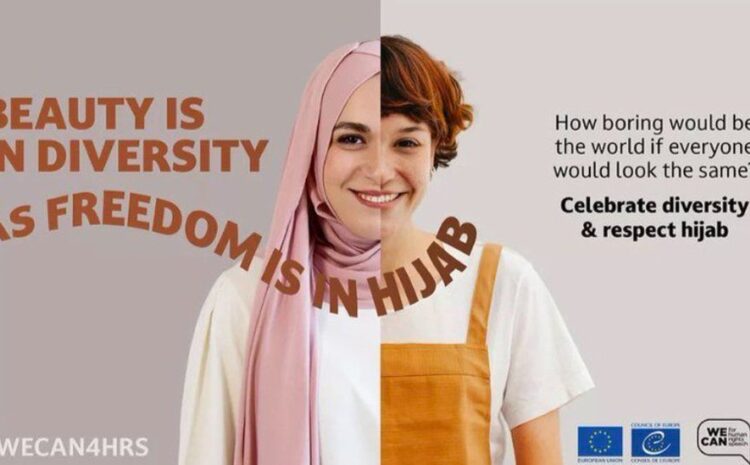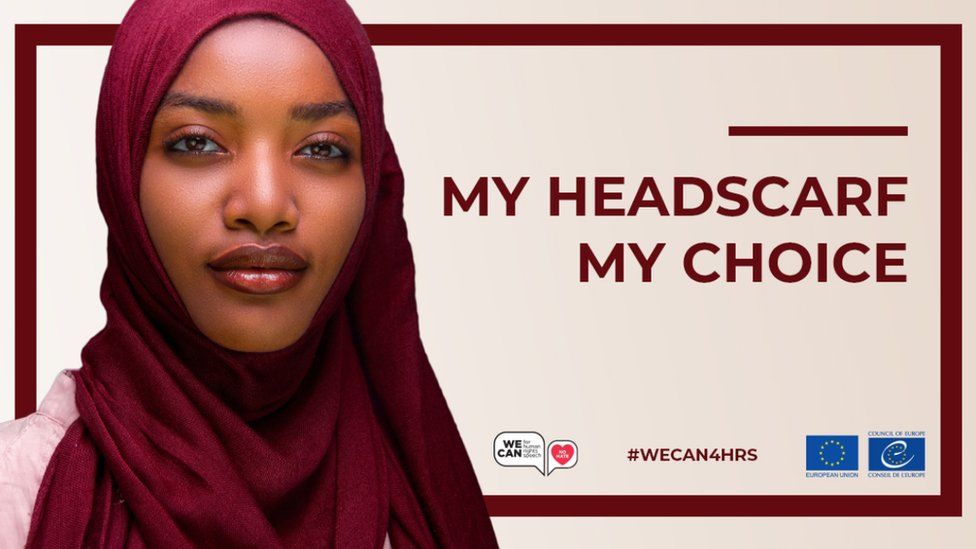
IMAGE SOURCE, COUNCIL OF EUROPE Image caption, The Council of Europe said some campaign posters – such as this one – were taken down
The Council of Europe released the images last week for a campaign against anti-Muslim discrimination.
A slogan on one advert read: “Beauty is in diversity as freedom is in hijab”.
Several prominent French politicians condemned the message and argued the hijab did not represent freedom.
But some Muslim women who wear headscarves said the reaction showed a lack of respect for diversity and the right to choose what to wear in France.
France’s youth minister, Sarah El Haïry, said she was shocked by one poster, which showed a split image of one women wearing a hijab, and one not.
On Wednesday, the Council of Europe told the BBC that tweets related to the campaign had been deleted “while we reflect on a better presentation of this project”.
A spokesman said the tweets were part of an anti-hate speech campaign led by the inclusion and anti-discrimination department of the Council of Europe.
One of Europe’s oldest political organisations, the Council of Europe aims to uphold human rights, democracy and the rule of law. Its activities are distinct from, but partly funded by, the European Union.
 IMAGE SOURCE, COUNCIL OF EUROPE
IMAGE SOURCE, COUNCIL OF EUROPEThe campaign was the product of two online workshops held in September and organised in collaboration with Femyso, a forum of Muslim youth organisations across Europe.
The wording of the campaign “reflected individual statements from people who took part in one of the project’s workshops”, the Council of Europe spokesman said.
The president of Femyso, Hande Taner, defended the campaign on Wednesday in an interview with the BBC.
She said “the campaign itself is still on” but added: “As for why the tweet was deleted, I can’t speak on behalf of the Council of Europe.”
Ms Taner said it was “really sad that the efforts of minority youth are being attacked and undermined” by politicians.
The reaction was “another example of how the rights of Muslim women are non-existent to those who claim to represent or protect notions such as liberty, equality and freedom”, she said.
The integration of all groups of Muslims into French society has become an increasingly prominent political issue in recent years. France hosts Europe’s largest Muslim minority, an estimated five million people.
The Council of Europe’s posters started drawing the attention of French politicians from parties of the left, right and centre on Monday.
Among those to weigh in were leading candidates in next year’s presidential election.
In one tweet, far-right commentator Eric Zemmour, who is riding high in the polls despite not yet declaring his candidacy, accused the campaign of promoting “the veiling of Europeans”.
National Rally candidate Marine Le Pen tweeted: “It’s when women take their veil off that they become free, not the other way around.”
Ms Taner responded: “If there’s a claim of freedom, this freedom should be universal.
“This should include the freedom to choose what to wear, but also the freedom to choose what not to wear.”
Ms Taner said in France, where is liberty is highly valued, “there is a double standard where this freedom is not protected at the same level” for specific groups, such as Muslim women.
